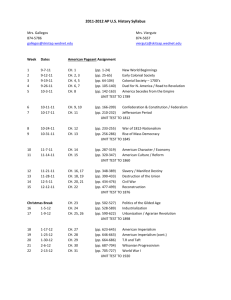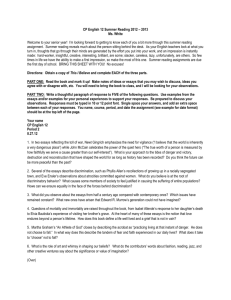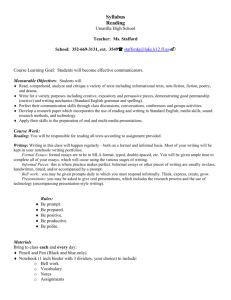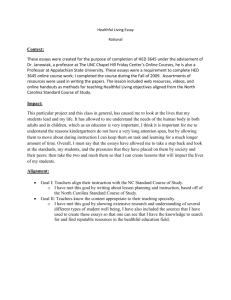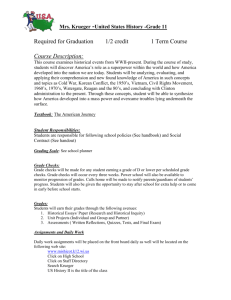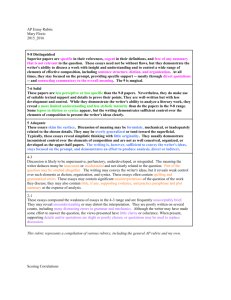Lake Travis High School
advertisement
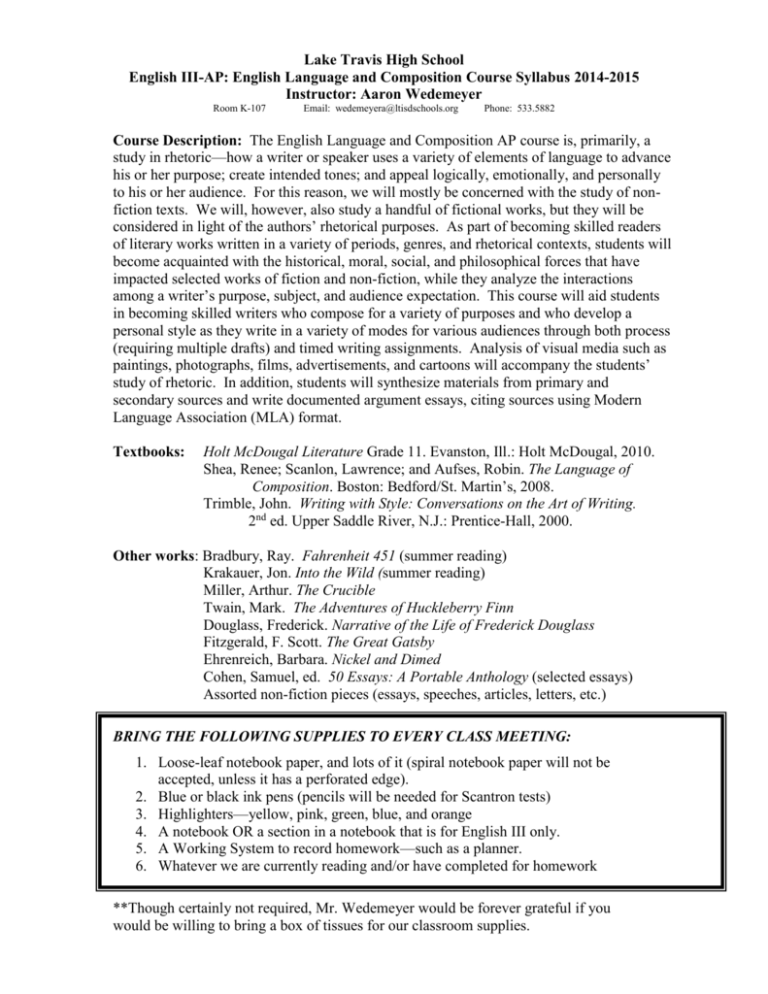
Lake Travis High School English III-AP: English Language and Composition Course Syllabus 2014-2015 Instructor: Aaron Wedemeyer Room K-107 Email: wedemeyera@ltisdschools.org Phone: 533.5882 Course Description: The English Language and Composition AP course is, primarily, a study in rhetoric—how a writer or speaker uses a variety of elements of language to advance his or her purpose; create intended tones; and appeal logically, emotionally, and personally to his or her audience. For this reason, we will mostly be concerned with the study of nonfiction texts. We will, however, also study a handful of fictional works, but they will be considered in light of the authors’ rhetorical purposes. As part of becoming skilled readers of literary works written in a variety of periods, genres, and rhetorical contexts, students will become acquainted with the historical, moral, social, and philosophical forces that have impacted selected works of fiction and non-fiction, while they analyze the interactions among a writer’s purpose, subject, and audience expectation. This course will aid students in becoming skilled writers who compose for a variety of purposes and who develop a personal style as they write in a variety of modes for various audiences through both process (requiring multiple drafts) and timed writing assignments. Analysis of visual media such as paintings, photographs, films, advertisements, and cartoons will accompany the students’ study of rhetoric. In addition, students will synthesize materials from primary and secondary sources and write documented argument essays, citing sources using Modern Language Association (MLA) format. Textbooks: Holt McDougal Literature Grade 11. Evanston, Ill.: Holt McDougal, 2010. Shea, Renee; Scanlon, Lawrence; and Aufses, Robin. The Language of Composition. Boston: Bedford/St. Martin’s, 2008. Trimble, John. Writing with Style: Conversations on the Art of Writing. 2nd ed. Upper Saddle River, N.J.: Prentice-Hall, 2000. Other works: Bradbury, Ray. Fahrenheit 451 (summer reading) Krakauer, Jon. Into the Wild (summer reading) Miller, Arthur. The Crucible Twain, Mark. The Adventures of Huckleberry Finn Douglass, Frederick. Narrative of the Life of Frederick Douglass Fitzgerald, F. Scott. The Great Gatsby Ehrenreich, Barbara. Nickel and Dimed Cohen, Samuel, ed. 50 Essays: A Portable Anthology (selected essays) Assorted non-fiction pieces (essays, speeches, articles, letters, etc.) BRING THE FOLLOWING SUPPLIES TO EVERY CLASS MEETING: 1. Loose-leaf notebook paper, and lots of it (spiral notebook paper will not be accepted, unless it has a perforated edge). 2. Blue or black ink pens (pencils will be needed for Scantron tests) 3. Highlighters—yellow, pink, green, blue, and orange 4. A notebook OR a section in a notebook that is for English III only. 5. A Working System to record homework—such as a planner. 6. Whatever we are currently reading and/or have completed for homework **Though certainly not required, Mr. Wedemeyer would be forever grateful if you would be willing to bring a box of tissues for our classroom supplies. Course Expectations Reading: Students generally find that close, critical reading provides one of the biggest challenges in English III-AP. In this course, students will read a variety of texts and will be held accountable for comprehension, interpretation, analysis, and vocabulary. Annotating closely and/or keeping a reading journal for notes, questions, and comments facilitates understanding, improves scores on reading quizzes, and contributes to the student’s ability to participate in class discussions. Composition: Students will write a variety of essays (e.g., expository, analytical, argumentative, etc.). In preparation for the AP English Language and Composition exam, most first drafts of essays will be written in class under time constraints. These will be graded using AP timed-writing rubrics and returned to students. Most of these timed writings will be processed—revised and edited—at least once. [See below for revision process details.] Students will complete various research-based synthesis writing assignments. The Revision Process For most essays, especially those written over a prompt from a previous AP exam, students will begin by closely re-reading and re-annotating the essay’s prompt. Students will then become acquainted with the scoring rubric and will read and evaluate a number of sample essays, considering the strengths and weaknesses of other writers’ approaches to the prompt. In their own first drafts, students will identify and highlight the following elements in their writing: Thesis/Topic Sentences, Details (evidence from text or examples), Elaboration (context for the detail, including identifying a writer’s rhetorical strategy), and Commentary (the student’s insights about the effect of the writer’s choices). Using a teacher-provided checklist, students will deconstruct their own first drafts, transferring them by their component parts into a chart and identifying areas of their writing that need revision (clarity, specificity, sentence variety, organization, etc.) Using Track Changes, students will revise and edit their essays, with all additions and deletions and other changes visible to both the student and teacher. For many of the essays, students will also be expected to complete a usage and mechanics revision, in which they will, with the help of the teacher, identify each usage and mechanics error in the first draft of the essay and determine the rule not followed, turning in corrections with explanations for each sentence. For some essays, students will also complete a style revision, in which they will be required to carry out a close inspection of their diction and syntax, revising so as to make their writing not just clear and logical but also pleasing to read. Graded Class Discussions: Because this class is designed to assess students’ abilities to communicate their ideas via verbal, as well as written, expression, students will occasionally participate in graded class discussions throughout the year. Criteria for these discussions will be provided, and students will be expected to come prepared to lead and/or participate in a worthy discussion over the reading. Academic Integrity: Students who plagiarize papers will be disciplined according to school policy. A zero will be given on the assigned paper, and proper disciplinary action will be taken. Students must not share work or steal writing from published authors. When outside sources are used in writing, students must document properly. When writing a process paper, students must complete and submit all steps of the writing process before receiving credit for the final paper. Downloading papers from the Internet and/or “sharing” other students’ writing will not be tolerated. All out-of-class papers will be submitted to Turnitin.com. Students talking, passing notes, using a cell phone, or communicating in any way during testing will be regarded as cheating and disciplined according to school policy. Make-up Work/Retesting: Make-up work is the student’s responsibility. o If a student misses class on the day of a test or quiz, he/she should expect to make up the test or quiz within one week. If the student has not made up a test or quiz within a week or by the time established with the instructor, then he or she will receive a zero. o If a student misses class on the day a paper/project is due, he/she is still expected to turn the paper/project in on time to turnitin.com and to email the instructor. All other make-up work must be done within the allotted time, according to school policy. Students should not expect to make up tests, quizzes, or in-class essays during class time. Students missing class for extra-curricular activities or a planned absence are expected to meet the same deadlines as his/her classmates and should arrange for making up work prior to the anticipated absence. Students are expected to utilize teacher webpages for assignment updates, resources, and make-up work. If you are absent, check my website. Late Work: Students are expected to complete all work on time. Any homework assignment not turned in on time will result in a zero. However, students will be allowed one FUDGIE per nine weeks. With a FUDGIE, students can turn in one homework assignment one class period late for a maximum grade of 75. Fudgies cannot be used on major grades or quizzes. A major assignment will be penalized 10% for each calendar day that it is late. Grading: Daily grades (40%): o o o Homework assignments (analysis, annotation, argument, etc.) Writing/grammar practices Vocabulary quizzes based on vocabulary from reading Major grades (60%): o o o o o Reading accountability quizzes Cumulative vocabulary tests In-class essays Major papers (2 grades: process and final) Graded discussion facilitation and participation




